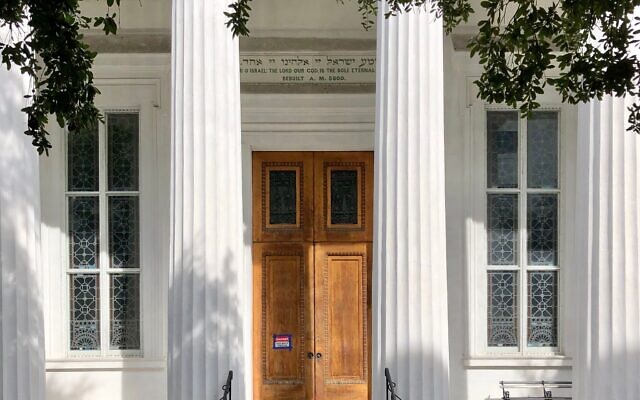Charleston rabbi resigns, leaving South Carolina over anti-LGBTQ legislation
Greg Kanter, one of three rabbis at historic Kahal Kadosh Beth Elohim congregation, tells community his family will move ‘to a place that will not target us and our human rights’

JTA — A rabbi at a historic synagogue in Charleston has announced his resignation from his congregation, and plans to leave South Carolina, over what he characterized as the state’s discriminatory treatment of LGBTQ people.
On Wednesday, Rabbi Greg Kanter, who is gay, told Kahal Kadosh Beth Elohim that he and his family would be seeking new opportunities in other states whose policies and public spaces are friendlier to LGBTQ people. Kanter is one of three rabbis at the Reform congregation, which was founded in 1749.
“A confluence of factors have gone into this decision including the barrage of legal challenges in the state of South Carolina that target me and my family,” Kanter wrote in a resignation letter sent to his congregation obtained by the Jewish Telegraphic Agency. “We find it necessary to take steps to move to a place that will not target us and our human rights.”
Kanter’s decision underscores the challenges LGBTQ Jews are increasingly facing in Republican-led states. As in other statehouses, lawmakers in South Carolina have proposed a flurry of laws targeting LGBTQ people, including measures banning medical care for trans youth and shielding people who oppose same-sex marriage and “gender identity ideology” from punishment. The Anti-Defamation League and other Jewish civil rights groups have criticized such legislation.
In addition, states including South Carolina have seen book bans focused on taking LGBTQ- and race-themed works off shelves; such efforts have also ensnared books about Jewish life and the Holocaust.
“They’re talking about weakening our marriage, going after trans kids, and I think adults and kids take notice when people in power do those things,” Kanter, who declined to speak to JTA, told the Forward. “It makes it rougher for all of us.”
Kanter added that he is raising a transgender child and that their family was affected when a local hospital recently stopped providing gender-related health care for minors.
Prior to his move to Charleston, Kanter was a rabbi at Temple Israel in Minneapolis. While in that role, he came out to his colleagues and congregation, and described them as “supportive.” He joined the Charleston synagogue in 2017, and said he would stay in his job through June 2024.
In a message sent along with Kanter’s resignation letter, Rabbi Stephanie Alexander and the synagogue’s president, Naomi Gorstein, called his announcement “bittersweet” and extended “every best wish to Rabbi Kanter and his family,” but did not address his reasons for the exit.
Charleston is home to one of the oldest Jewish communities in the country, which numbered around 10,000 according to a 2016 study, and remains a major hub of Southern Jewish life. Proposed restrictions on LGBTQ life are contrary to the values of Charleston’s Jewish community, Brandon Fish, director of the city’s Jewish Community Relations Council, told JTA.
“Jewish people of every race, nationality, gender, gender identity, and sexual orientation deserve to feel safe to live, raise families, and engage Jewishly in South Carolina,” Fish said in a statement about Kanter’s resignation. “Regressive social policy will continue to negatively impact all of our communities and drive good people and businesses away from our state.”
Fish is a member of Kanter’s synagogue and had publicized the news of Kanter’s resignation on Twitter without identifying him by name. Fish told JTA that his organization has collaborated with LGBTQ advocacy groups in the state to push for the adoption of broader hate-crimes laws that would encompass discrimination based on gender and sexuality.
The group has also sought to push back on what Fish characterized as state legislators’ reliance on the Bible to justify such laws. “We’ve reminded them that not all South Carolinians are Christians,” he said.
In at least one case, however, lawmakers have invoked Jewish observance to justify a proposal. The bill to shield opponents of same-sex marriage from punishment cites America’s tradition of religious freedom, including “the right of Jews and other Sabbath observers to dedicate their time to God and family instead of work on their Sabbath.”










